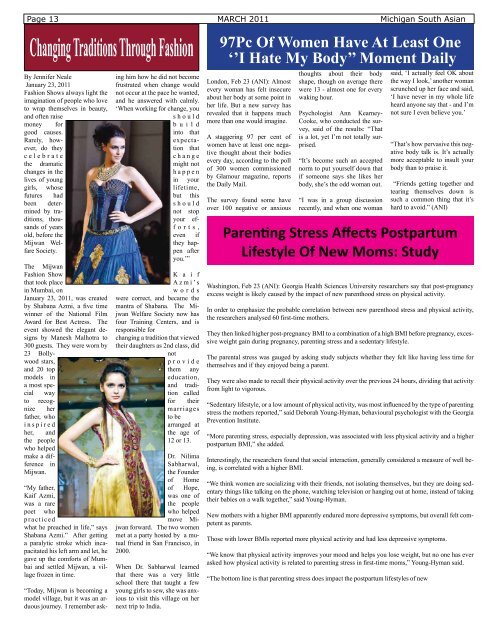Mar 2011 - Michigan South Asian
Mar 2011 - Michigan South Asian
Mar 2011 - Michigan South Asian
Create successful ePaper yourself
Turn your PDF publications into a flip-book with our unique Google optimized e-Paper software.
Page 13 MARCH <strong>2011</strong> <strong>Michigan</strong> <strong>South</strong> <strong>Asian</strong><br />
Changing Traditions Through Fashion<br />
By Jennifer Neale<br />
January 23, <strong>2011</strong><br />
Fashion Shows always light the<br />
imagination of people who love<br />
to wrap themselves in beauty,<br />
and often raise<br />
money for<br />
good causes.<br />
Rarely, however,<br />
do they<br />
celebrate<br />
the dramatic<br />
changes in the<br />
lives of young<br />
girls, whose<br />
futures had<br />
been determined<br />
by traditions,<br />
thousands<br />
of years<br />
old, before the<br />
Mijwan Welfare<br />
Society.<br />
The Mijwan<br />
Fashion Show<br />
that took place<br />
in Mumbai, on<br />
January 23, <strong>2011</strong>, was created<br />
by Shabana Azmi, a five time<br />
winner of the National Film<br />
Award for Best Actress. The<br />
event showed the elegant designs<br />
by Manesh Malhotra to<br />
300 guests. They were worn by<br />
23 Bollywood<br />
stars,<br />
and 20 top<br />
models in<br />
a most special<br />
way<br />
to recognize<br />
her<br />
father, who<br />
inspired<br />
her, and<br />
the people<br />
who helped<br />
make a difference<br />
in<br />
Mijwan.<br />
“My father,<br />
Kaif Azmi,<br />
was a rare<br />
poet who<br />
practiced<br />
what he preached in life,” says<br />
Shabana Azmi.” After getting<br />
a paralytic stroke which incapacitated<br />
his left arm and let, he<br />
gave up the comforts of Mumbai<br />
and settled Mijwan, a village<br />
frozen in time.<br />
“Today, Mijwan is becoming a<br />
model village, but it was an arduous<br />
journey. I remember ask-<br />
ing him how he did not become<br />
frustrated when change would<br />
not occur at the pace he wanted,<br />
and he answered with calmly.<br />
‘When working for change, you<br />
should<br />
build<br />
into that<br />
expectation<br />
that<br />
change<br />
might not<br />
happen<br />
in your<br />
lifetime,<br />
but this<br />
should<br />
not stop<br />
your efforts,<br />
even if<br />
they happen<br />
after<br />
you.’”<br />
K a i f<br />
Azmi’s<br />
words<br />
were correct, and became the<br />
mantra of Shabana. The Mijwan<br />
Welfare Society now has<br />
four Training Centers, and is<br />
responsible for<br />
changing a tradition that viewed<br />
their daughters as 2nd class, did<br />
not<br />
provide<br />
them any<br />
education,<br />
and tradition<br />
called<br />
for their<br />
marriages<br />
to be<br />
arranged at<br />
the age of<br />
12 or 13.<br />
Dr. Nilima<br />
Sabharwal,<br />
the Founder<br />
of Home<br />
of Hope,<br />
was one of<br />
the people<br />
who helped<br />
move Mijwan<br />
forward. The two women<br />
met at a party hosted by a mutual<br />
friend in San Francisco, in<br />
2000.<br />
When Dr. Sabharwal learned<br />
that there was a very little<br />
school there that taught a few<br />
young girls to sew, she was anxious<br />
to visit this village on her<br />
next trip to India.<br />
97Pc Of Women Have At Least One<br />
‘’I Hate My Body’’ Moment Daily<br />
London, Feb 23 (ANI): Almost<br />
every woman has felt insecure<br />
about her body at some point in<br />
her life. But a new survey has<br />
revealed that it happens much<br />
more than one would imagine.<br />
A staggering 97 per cent of<br />
women have at least one negative<br />
thought about their bodies<br />
every day, according to the poll<br />
of 300 women commissioned<br />
by Glamour magazine, reports<br />
the Daily Mail.<br />
The survey found some have<br />
over 100 negative or anxious<br />
thoughts about their body<br />
shape, though on average there<br />
were 13 - almost one for every<br />
waking hour.<br />
Psychologist Ann Kearney-<br />
Cooke, who conducted the survey,<br />
said of the results: “That<br />
is a lot, yet I’m not totally surprised.<br />
“It’s become such an accepted<br />
norm to put yourself down that<br />
if someone says she likes her<br />
body, she’s the odd woman out.<br />
“I was in a group discussion<br />
recently, and when one woman<br />
said, ‘I actually feel OK about<br />
the way I look,’ another woman<br />
scrunched up her face and said,<br />
‘I have never in my whole life<br />
heard anyone say that - and I’m<br />
not sure I even believe you.’<br />
“That’s how pervasive this negative<br />
body talk is. It’s actually<br />
more acceptable to insult your<br />
body than to praise it.<br />
“Friends getting together and<br />
tearing themselves down is<br />
such a common thing that it’s<br />
hard to avoid.” (ANI)<br />
Parenting Stress Affects Postpartum<br />
Lifestyle Of New Moms: Study<br />
Parenting stress affects postpartum lifestyle of new moms: Study Home<br />
Washington, Feb 23 (ANI): Georgia Health Sciences University researchers say that post-pregnancy<br />
excess weight is likely caused by the impact of new parenthood stress on physical activity.<br />
In order to emphasize the probable correlation between new parenthood stress and physical activity,<br />
the researchers analysed 60 first-time mothers.<br />
They then linked higher post-pregnancy BMI to a combination of a high BMI before pregnancy, excessive<br />
weight gain during pregnancy, parenting stress and a sedentary lifestyle.<br />
The parental stress was gauged by asking study subjects whether they felt like having less time for<br />
themselves and if they enjoyed being a parent.<br />
They were also made to recall their physical activity over the previous 24 hours, dividing that activity<br />
from light to vigorous.<br />
“Sedentary lifestyle, or a low amount of physical activity, was most influenced by the type of parenting<br />
stress the mothers reported,” said Deborah Young-Hyman, behavioural psychologist with the Georgia<br />
Prevention Institute.<br />
“More parenting stress, especially depression, was associated with less physical activity and a higher<br />
postpartum BMI,” she added.<br />
Interestingly, the researchers found that social interaction, generally considered a measure of well being,<br />
is correlated with a higher BMI.<br />
“We think women are socializing with their friends, not isolating themselves, but they are doing sedentary<br />
things like talking on the phone, watching television or hanging out at home, instead of taking<br />
their babies on a walk together,” said Young-Hyman.<br />
New mothers with a higher BMI apparently endured more depressive symptoms, but overall felt competent<br />
as parents.<br />
Those with lower BMIs reported more physical activity and had less depressive symptoms.<br />
“We know that physical activity improves your mood and helps you lose weight, but no one has ever<br />
asked how physical activity is related to parenting stress in first-time moms,” Young-Hyman said.<br />
“The bottom line is that parenting stress does impact the postpartum lifestyles of new moms,” she said.<br />
The study is published in Women and Health. (ANI)






